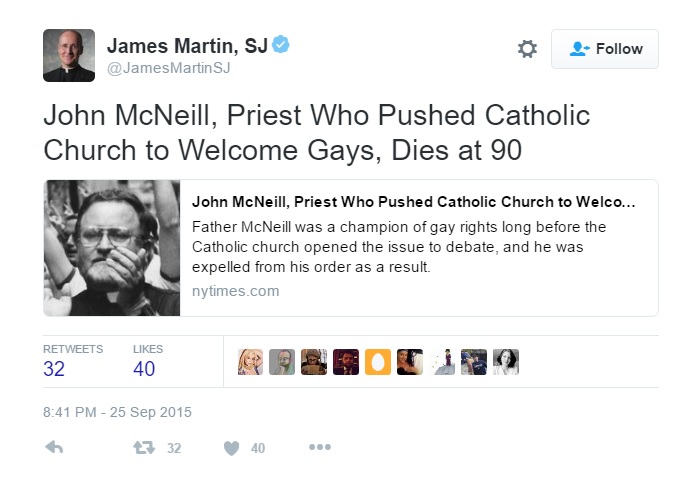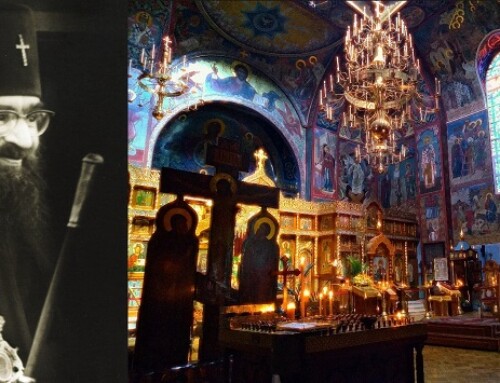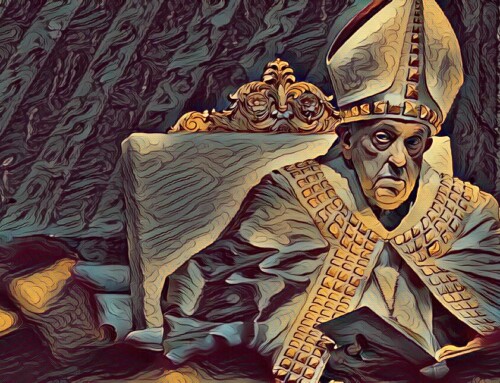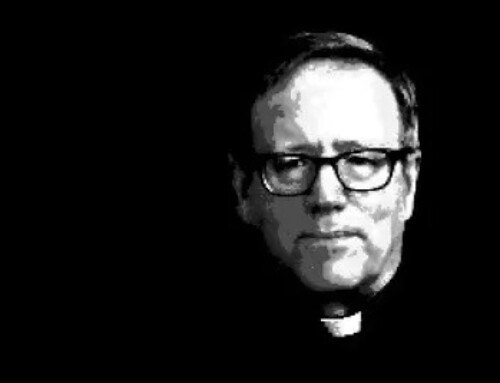“We gay and lesbian Catholics, who know that we were created homosexual by God, see this statement as a blasphemy against God by claiming that God created something that is intrinsically ordered to evil.” – Spoken by John J. McNeill, S.J., at an Address to Dignity in 2009; following McNeill’s death in 2015, the fellow Jesuit James Martin praised his predecessor as a man “who pushed Catholic Church to welcome gays.”
In the 1990s, I had a dear friend who was raised Catholic and always seemed to anxiously waver on the intensity of his homosexual identity. He was very much unlike me in that I rather gleefully disregarded what I considered the somewhat quaint, but rather meaningless stories from childhood about a bare-footed hippie Jesus. While he was several years older than me, and from what he described about growing up in a more orthodox school of Catholicism, I thought he was simply unable to throw off the lingering shame from his religious upbringing. But one day I found him elated because a local Catholic priest had recommended that he read Jesuit John J. McNeill’s landmark book “The Church and the Homosexual.” He encouraged many of his friends to deeply study it and even bought an extra copy for me. I took it home, tossed it in a box and never looked at it again. Years later, I finally read it. McNeill primarily argued that homosexuality was an inborn trait and that:
“Since most gay people experience their homosexual orientation as a part of creation, if they accept this Church teaching, they must see God as sadistically creating them with an intrinsic orientation to evil. Most gays would prefer to see the Church teaching as wrong, rather than believe God is sadistic.”
My friend wholeheartedly swallowed the entirety of McNeill’s argument. For him, it settled some persistent torment. He started attending in earnest the nearby gay-affirmative parish, and began spiritual direction with the priest who recommended the book. I was passingly familiar with this priest and his parish; I considered them an odd lot. They partied like the rest of us, frequented the same bars and even the same bathhouses, pretending to be on the hunt for that perfect guy they would settle down with. Yet they needed the Church, and some higher-power, to tell them that everything was okay. As for myself, I neither sought out nor desired approval from anyone, let alone God. Following the advice of his new priest counselor, my friend settled down with one guy; that didn’t work out, and then he found another. We drifted apart as I was still totally connected to the 24 hour party scene and he wanted to stay home.
The next time I would hear his name was in a meaningless conversation when I inadvertently eavesdropped to find out who suddenly had AIDS and listen for a mention of someone I might have known that was now no longer with us – I couldn’t believe it when someone said he was dying. Apparently, the man he met shortly after returning to this newfound form of “gay” Catholicism hadn’t been as faithful as my friend expected and his lover passed along the HIV virus. He died about a year later.
As for John McNeill, he would eventually “marry” his same sex lover and continue to write and speak out against the Church’s teachings on homosexuality. Even towards the end of his life, McNeill would persistently argue:
“…that God created us, God would be sadistic if he created you gay and said ‘you can’t act on it.’ Everyone has a right to – a sexual right. And they also have the duty to use their sex appropriately, you know. No dealing with minors or rape anything like that but I think if any human, gay or straight, has sex in a consenting relationship – especially a loving relationship – then I think God approves of it.”
Now, there is a new John McNeill in the Church in the form of James Martin. In a video interview for the IN Network, a division of the Los Angles based Loyola Productions, profiling various “LGBTQ Catholics” and their allies, Martin said the following: “The idea that someone can come-out and be honest and transparent and open about the way that God created them, I think is terrific – it’s something the Catholic Church can support.” In that single statement, Martin just condemned men and women that are possibly confused and conflicted, who may hear Martin’s words and be impressed by his credentials and standing, and recent Vatican appointment, to their imprisonment within the gay identity. Once this acceptance of homosexuality as an indelible, in-born, even God given attribute takes place – the true believer in this myth returns to the original supposition proposed by McNeill: How could a loving God intentionally make me somehow “disordered?” At that point, they must reject Church teaching. Recently, numerous, well-known “gay” Catholics, who also hold leadership positions in LGBT ministries, have asked the faithful to sign a petition demanding that the Catechism be changed with regard to wording describing homosexuality. But this just isn’t an issue of semantics, because many believe, as Martin attests, that homosexuality is a fundamental part of their identity: Martin once boldly wrote: “Saying that one of the deepest parts of a person—the part that gives and receives love—is “disordered” in itself is needlessly cruel.”
Yet, this position not only effects the person with same-sex attraction, but the entire family that attempts to both love their “gay” family member and hold fast to the Faith; if one accepts Martin’s argument for a divinely genetic cause of homosexuality, something’s got to give. For example, in the same video series for the IN Network that Martin participated, there are several interviews with the parents of same-sex attracted children; such as Javier and his wife Martha Plasencia who started the “Always Our Children” ministry for the parents of “gay” children in the Archdiocese of Los Angeles. Javier and Martha were asked about their “gay” son and their ministry; Martha said that: “The language in the Catechism has to change. That word ‘intrinsically disordered,’ my son is not intrinsically disordered. And the bullets from the Catechism, they can harm a lot of children – I mean to the extent of suicide.” Martin has asked for the same thing, stating: “…some of that language needs to be retired. I think language like ‘objective disorders’ – those kinds of things are very hurtful for people.” But the reason these words are “hurtful” to some is because priests such as John McNeill and Martin himself have convinced a group of “gay” Catholic men and women that God created them as homosexuals. This is essentially a self-created problem that is not duly concerned about the emotional state of those with same-sex attraction, but is a ploy to force the Church into compromise. Many have needlessly died due to this lie; how many more?






Yes – where is the science? No gay gene has ever been found. Attraction is a deeply psychological issue (gay or straight), not inborn, but a result of our parents and early caretakers. Both their good and bad traits become part of what we are later attracted to. None of us are “born this way.”